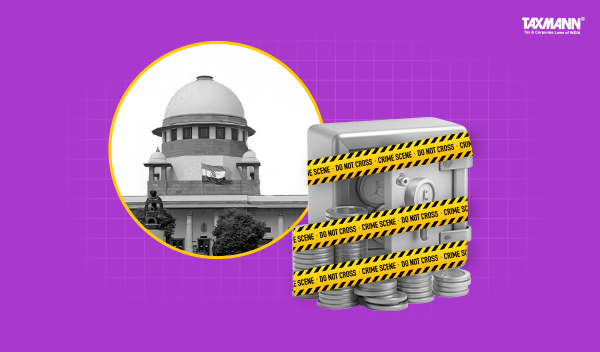Seized Cash From Other Person Can’t Be Adjusted Against Tax Liability of Assessee Till Date of Framing of Assessment | HC
- Blog|News|Income Tax|
- 2 Min Read
- By Taxmann
- |
- Last Updated on 18 September, 2024

Case Details: Kamla Mehta vs. Commissioner of Income-tax - [2024] 166 taxmann.com 356 (Punjab & Haryana)
Judiciary and Counsel Details
- Sanjeev Prakash Sharma & Jagmohan Bansal, JJ.
- Ms. Radhika Suri, Sr. Adv., Parnika Singla, & Abhinav Narang, Adv. for the Appellant.
- Saurabh Kapoor, Sr. Standing Counsel for the Respondent.
Facts of the Case
The assessee and one other person were searched under section 132. In the course of search, some cash was found and seized from the other person. The assessee and the other person claimed that the seized cash belonged to the assessee and furnished a letter to the Assessing Officer (AO).
Assessees requested that cash be adjusted against their tax liabilities. However, until the assessment of both parties was completed, cash was treated as belonging to the other person. AO eventually adjusted cash against the assessee’s tax liability but charged interest for delayed payment of tax under section 234B.
Assessees argued that cash should have been adjusted earlier as advance tax and that no interest should be charged. The matter reached before the Punjab & Haryana High Court.
High Court Held
The High Court held that section 132B provides for the application of seized or requisitioned assets. It provides that the assets seized under section 132 may be adjusted against the tax liability of the assessee. Section 132B(1) provides that the assets seized under section 132 may be adjusted against the tax liability of the assessee.
In the case at hand, the cash was seized from the possession of another person. The assessee and the other person claimed that the cash belonged to the assessee and was the sale proceeds of a house. Both persons claimed an equal share in the seized cash.
The AO framed the assessment in 2009. The said assessment was framed within the stipulated limitation period. As per the assessee, the seized cash must be adjusted against their tax liability even before the date of framing of assessment. However, till the date of framing assessment of the assessee and the other person, despite their affidavits/statements, the cash belonged to the other person.
It was a matter of chance that no tax liability arose against the other person. Had some tax liability arisen against the other person, the Revenue was bound to adjust the seized cash against his tax liability. Seized cash could not be adjusted against the tax liability of the assessee.
It was not a case of constructive possession of cash by the assessee. The cash was actually in the possession of the other person. Thus, till the date of framing assessment, he was the owner of said cash, and it could not be adjusted against the tax liability of the assessee. Therefore, the AO correctly adjusted seized cash from the date of framing of assessment and charged interest under Section 234B on delayed payment of advance tax.
List of Cases Reviewed
- Order of ITAT in ITA No.57/ASR/2010 dated 16.12.2011 – [Para 17] – Affirmed.
Disclaimer: The content/information published on the website is only for general information of the user and shall not be construed as legal advice. While the Taxmann has exercised reasonable efforts to ensure the veracity of information/content published, Taxmann shall be under no liability in any manner whatsoever for incorrect information, if any.

Taxmann Publications has a dedicated in-house Research & Editorial Team. This team consists of a team of Chartered Accountants, Company Secretaries, and Lawyers. This team works under the guidance and supervision of editor-in-chief Mr Rakesh Bhargava.
The Research and Editorial Team is responsible for developing reliable and accurate content for the readers. The team follows the six-sigma approach to achieve the benchmark of zero error in its publications and research platforms. The team ensures that the following publication guidelines are thoroughly followed while developing the content:
- The statutory material is obtained only from the authorized and reliable sources
- All the latest developments in the judicial and legislative fields are covered
- Prepare the analytical write-ups on current, controversial, and important issues to help the readers to understand the concept and its implications
- Every content published by Taxmann is complete, accurate and lucid
- All evidence-based statements are supported with proper reference to Section, Circular No., Notification No. or citations
- The golden rules of grammar, style and consistency are thoroughly followed
- Font and size that’s easy to read and remain consistent across all imprint and digital publications are applied



 CA | CS | CMA
CA | CS | CMA
